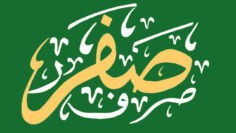
When is Hajj 2023?
Hajj is the sacred pilgrimage performed by Muslims at the holy mosque of Masjid al-Haram in Makkah, Saudi Arabia. It is one of the five pillars of Islam, which means that it is obliged of every Muslim at least once in their lifetime (so long as they have the means). Hajj takes place during the same period each year – during the month of Dhul Hijjah, the twelfth month in the Islamic Calendar. Hajj begins on the 8th of Dhul Hijjah and lasts until the 13th of Dhul Hijjah.
This year, Hajj is taking place between 26th June to the 1st July 2023 in the Gregorian Calendar.
The Islamic calendar operates on the lunar cycle, which is why it appears to shift forward approximately 11-12 days each year as it corresponds to the Gregorian calendar.
As Muslims, undertaking Hajj in Islam – is a spiritual duty, as long as we are financially, physically, and emotionally able to do so.
In the Holy Qur’an, Allah (SWT) commands Muslims to take this sacred journey:
You will enter the Sacred Masjid, God willing, perfectly secure, and you will cut your hair or shorten it (as you fulfil the pilgrimage rituals) there. You will not have any fear. Since He knew what you did not know, He has coupled this with an immediate victory.
Qur’an | 48:27
While it is only required of Muslims to perform the Hajj at least once in their lifetimes, it can be performed multiple times.
How Long Does Hajj Last?
The Hajj pilgrimage is performed over five to six days, from the 8th to 12th or 13th of Dhul Hijjah. When the new crescent moon is sighted, Eid al-Adha begins, which lasts for four days.
The pilgrimage is comprised of a series of rites and rituals, some of which must be performed in order. It can be physically demanding, as pilgrims are required to travel between locations throughout, and can walk on average between 5km-15km per day. Performing Hajj is a test of patience and temperament – it is a spiritual, emotional, and physical challenge, it can take some preparation and for many, it is a once in a lifetime event.
However, it offers Muslims the opportunity to refresh their spiritual selves, to cleanse them of their sins and draw closer to Allah (SWT).
You can access everything you need to know about Hajj and what it entails here.
Does Hajj Occur On The Same Dates Every Year?
Yes, Hajj takes place between the same dates each year. Hajj takes place between the 8th and the 12th or 13th of Dhul Hijjah each year, depending on the sighting of the moon.
Dhul Hijjah is the twelfth month in the Islamic calendar and holds some of the most sacred periods of the entire Islamic calendar. Dates in the Islamic calendar appear to shift forward approximately 11-12 days as it corresponds to the Gregorian calendar, as the Islamic Calendar operates on the lunar cycle.
Hajj consists of its own unique rites and rituals but does share some similarities with the rites and rituals of Umrah. Umrah is a voluntary pilgrimage, which can be performed during any time of the year.
Where Does The Hajj Take Place?
Hajj is performed in Makkah, modern day Saudi Arabia. The pilgrimage consists of a series of rites and rituals across five to six days and is performed across several locations within the vicinity of Makkah.
These locations include:
- The city of Makkah
- The tent settlement of Mina
- Mount ‘Arafah
- Muzdalifah
Who Is Excluded From Hajj?
It is required of every Muslim to perform Hajj at least once in their lifetime. However, the Hajj is not intended as a burden upon Muslims, and Muslims are only required to perform Hajj so long as it is within their capacity.
Those who are exempt from Hajj are the following:
- Firstly, only Muslim adults (whether male or female) are required to perform Hajj. This means that while children may go to Hajj, it is not required of them.
- Secondly, the very weak, sick, elderly, or otherwise physically incapable Muslims are exempt from having to perform the pilgrimage.
- Thirdly, the Muslim must be financially able to perform Hajj. However, if one is in debt, they may still perform Hajj as long as:
- The creditor permits it
- The debtor has time to pay off the debt
- Hajj does not affect their ability to pay off the debt
Brief History Of The Hajj
In 628 CE, the Prophet Muhammad (peace and blessings be upon him) and the Muslims embarked on the first Islamic Pilgrimage (Hajj), re-establishing the traditions started by the Prophet Ibrahim (AS), who first began the tradition of Hajj millennia before.
The story of Hajj begins with the story of Ibrahim (AS) and the commandment of Allah (SWT) to travel to the barren desert of Makkah and leave his wife Hajar and infant son Ismail (AS). They followed the commandment of Allah (SWT).
Hajar and Ismail (AS) quickly ran out of resources, and in a desperate effort to find water, Hajar ran between the two neighbouring hills of Safa and Marwa in search of someone who could help or nearby water. She did this seven times, only to return to a crying Ismail (AS) empty handed.
As the infant baby cried, Ismail (AS) struck the ground with his leg, and a stream of water burst forth at the commandment of Allah (SWT). This stream of water relieved the pair of their thirst and became a resource with which they traded for provisions of all kinds with travelling merchants. This stream of water is known today as the well of Zam Zam.
Ibrahim (AS) was commanded to return to his family years later, only to find the miracle of his family alive and indeed thriving. The pitch that had started with Hajar and Ismail (AS) was now transforming into a thriving settlement that would become known as Makkah.
Ibrahim (AS) was then instructed by Allah (SWT) to mark the space with a stone structure known as the Kaaba. Ibrahim (AS) built it with his son Ismail (AS), in the exact same spot it was first built by the first man and prophet of Allah (SWT), Adam (AS).
The space was created for worshippers of the one God to gather, and the stone structure known as the Kaaba simply marks the spot where Muslims unite. It is not something that is worshipped, as idolatry is prohibited in Islam.
Over time, the Kaaba would be taken over by pagan Arabs, who filled it with idols.
Thousands of years later, when the Prophet Muhammad (peace and blessings be upon him) was given revelation and the final message of Tawheed (monotheism), he was instructed to reinstate Ibrahim’s (AS) sacred tradition– the sacred pilgrimage we know as Hajj today.
You can read this story in detail, as well as the significance of Qurbani and more in our comprehensive Hajj guide.
When Did The First Hajj Pilgrimage Take Place?
Hajj as we know it today was first performed in 628 CE, by the Prophet Muhammad (peace and blessings be upon him) and the Muslims. He (peace and blessings be upon him) was instructed to re-establish the traditions started by the Prophet Ibrahim (AS) as instructed by Allah (SWT), millennia before.
Benefits of Hajj
Hajj involves travel and it requires more effort than other kinds of worship. This is the reason that Allah Has only made it mandatory for His servants to perform it only once in a lifetime with the stipulation that one must be able to do it both financially and physically. The benefits and hidden wisdom of Hajj are many and some of these (according to Hadith) are given below:
1- Hajj is one of the Five Pillars of Islam
Messenger of Allah (S.A.W.) said:
“Islam is based on five (principles) and performing Hajj is one of them.”
(Sahih Bukhari: 8)
Since Hajj is one of the five pillars of Islam, only this fact indicates its importance and it also shows how much Allah loves it.
2- All Previous Sins will be forgiven
As narrated by Abu Hurairah (R.A.), Prophet (S.A.W.) said:
“Whoever performs Hajj for Allah’s pleasure and does not have sexual relations with his wife, and does not do evil or sins then he will return (after Hajj free from all sins) as if he were born anew.”
(Sahih Bukhari: 1521)
According to the Hadith, if Hajj is performed according to Sunnah and just to please Allah then it will purify all the sins and pilgrims will become sinless as a newborn child.
3- Paradise is the Reward
Narrated by Abu Hurairah (R.A.) that Prophet (S.A.W.) said:
“And the reward of Hajj Mabrur (the one accepted by Allah) is nothing except Paradise.”
(Sahih Bukhari: 1773)
Hadith is self-explanatory and clearly states that if Hajj is performed with the right intention and according to Sunnah, then Allah will definitely accept the Hajj, and the reward of Hajj accepted by Allah is nothing but Jannah (Paradise).
4- Pilgrims of Hajj are Guests of Allah
In Islam, guests are treated with utmost respect, love and dignity. This fact is also evident from the following Hadith:
“Whoever believes in Allah and the Last Day, should serve his guest generously.”
(Sahih Bukhari: 6135)
In this hadith, Prophet (S.A.W.) has directed us that how we should treat our guests. Then just think about how the guest will be treated when hosted by Allah, The Creator of All Worlds.
Following hadith clearly shows that Pilgrims of Hajj and Umrah are guests of Allah.
“The pilgrims performing Hajj and ‘Umrah are a delegation to Allah. If they call upon Him, He will answer them; and if they ask for His forgiveness, He will forgive them.”
(Ibn Majah: 2892)
So perform Hajj and become a guest of Allah and ask Him whatever you want in this world and the hereafter.
5- For Women, Hajj is equal to Jihad
Narrated by Aisha (R.A.):
‘I said, “O Allah’s Messenger (S.A.W.)! We consider Jihad as the best deed.” The Prophet (S.A.W.) said, “The best Jihad (for women) is Hajj Mabrur.”’
(Sahih Bukhari: 1520)
According to the hadith, Hajj is the best Jihad for a woman (as women are not required to actively participate in hand-to-hand combats).
How Hajj is Performed?
Hajj begins on the 8th day of Dhul-Hijjah and ends on the 13th day of the same Islamic month. Many rituals are performed during Hajj and these may be completed over the course of the 5 days. Every year, millions of Muslims around the world participate in this Holy Pilgrimage to the city of Makkah, Saudi Arabia.
Complete Hajj comprises of many rituals which include Type of Hajj, Fundamentals (Faraidh), Obligations (Wajibaat) and Sunnah of Hajj, donning Ihraam, what should be done on each day of Hajj, etc. All these steps cannot be covered in this short article. Please visit our ‘How Hajj is Performed – A step by step guide to know all about Hajj.
Eid Al Adha
On the 10th of Dhul Hijja, Eid al Adha is celebrated. It is the day when Muslims slaughter an animal, generally a sheep, a goat, a cow, or a camel; remembering the sacrifice of Prophet Ibrahim (A.S.). Prophet Ibrahim (A.S.) intended to slaughter his son Prophet Ismail (A.S.) on Allah’s orders, but Allah replaced Prophet Ismail (A.S.) with a sheep just when Prophet Ibrahim (A.S.) was about to go ahead with the sacrifice. This submissive act of faith by Prophet Ibrahim (RA) is an integral part of Hajj as it signifies trust and total surrender to the will of the Almighty Allah. Stoning the wall of Satan (Jamarat) is the reminder of faith that one should have in Allah, as shown by Prophet Ibrahim (A.S.) and Prophet Ismael (A.S.).








